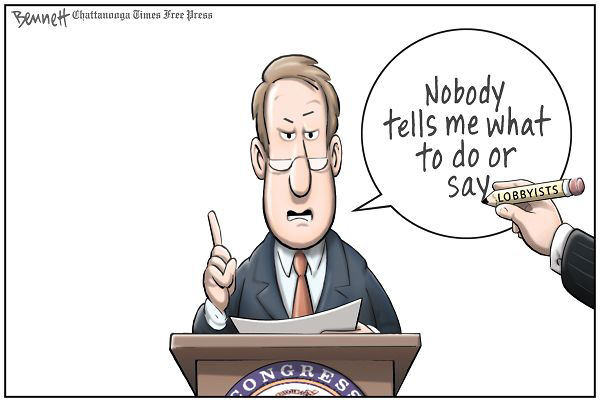 Image via Wikipedi)((a
Image via Wikipedi)((a
Here is the Senator in a recent Op-Ed in the Dallas Morning News explaining why he
voted against the Baucus Bill:
The nonpartisan Congressional_Budget_Office said the bill will cost $829 billion, but when it's fully implemented, the Senate Budget Committee estimates the real cost to be $1.8 trillion. Either way, it would still leave 25 million Americans uninsured, impose billions of dollars in new taxes and mandates, and cut more than $400 billion from Medicare. It would take away Medicare Advantage benefits from seniors, and make Medicaid the only option for 14 million Americans.
Or in other words, he's against the whole thing. You should really read the whole thing before jumping to any conclusions (
click here for the full article), but let's take these one at a time shall we?
(Feel free to disagree with me in the comments)
1. "The bill will cost $829 billion, but when it's fully implemented, the Senate Budget Committee estimates the real cost to be $1.8 trillion."That sounds like a lot of money doesn't it? The problem with this figure is that it
is highly misleading:
The bill received an important boost last week when the Congressional Budget Office estimated that it would cost $829 billion over the next 10 years — well under the $900 billion President Obama had suggested — and would reduce the deficit by $81 billion over that period.
Senator Cornyn and I have similar concerns in that many of the cost saving mechanisms seem like pipe-dreams, but there are some actual revenue generators (see below).
2. "Either way, it would still leave 25 million Americans uninsured..."One conclusion I'm completely confident making here is that Republicans do not believe that 46 million people are currently uninsured because they are too poor. Senator Cornyn admittedly might, but here's the standard talking point from Philip Klein in the
American Spectator who claims, "the ubiquitous figure is highly misleading":
When all of these factors are put together, the 2003 BlueCross BlueShield study determined that 8.2 million Americans are actually without coverage for the long haul, because they are too poor to purchase health care but earn too much to qualify for government assistance.
Some are arguing that the Baucus bill doesn't go far enough to expand coverage, but that is primarily the result of lowering subsides to low income Americans in order to reduce the price tag. Here's a
helpful breakdown of the two bill's in Congress:
Under the HELP Committee bill, 27 million people would buy insurance through an exchange, using subsidies that would cost the government $723 billion over 10 years. The Finance Committee bill would spend $461 billion for the 23 million people who would enroll in insurance through an exchange.
3. "...impose billions of dollars in new taxes and mandates"One of the aforementioned revenue generators is the "excise tax" on Cadillac plans which would begin in 2013. Republicans oppose this measure, yet it
is judged by some to be one of the best cost containment measures in the bill.
As for the mandates, it seem like a logical component when you consider the bill will also bar insurers from cherry-picking only the healthiest customers. Wouldn't a sensible compromise then be to require everyone to buy into the pool thereby lowering the overall risk, and provide subsidies to poor people to follow suit?
Yes:
The HELP Committee bill includes an individual mandate that requires nearly everyone to obtain some form of health coverage or pay a $750 penalty, with a maximum of $3,000 for a family. The principles behind this policy are simple: Only by getting everyone covered can the cost of healthcare be spread more equitably and the health of Americans improved.
The Finance Committee started out with a very similar proposal, but it was watered down because of worries that people would be punished if they simply could not afford insurance. More people were exempted and penalties scaled back.
[UPDATE]Or no, as Tyler Cowen explains in today's NY Times, "
Why an insurance mandate could leave many worse off".
4. "and cut more than $400 billion from Medicare."Looks like he's right on this one:
The Finance Committee, which has jurisdiction over Medicare and other health programs, identified $404 billion in spending cuts. Republicans have attacked those cuts as harmful to seniors, which could make them tough to keep.
I'll only add that the recent news that
Democrats lost the fight to raise Medicare reimbursement rates I think proves our government's bipartisan appreciation for budget gimmickry. Passing temporary fixes to the Medicare growth rate formula (which is what this was) began some time ago and is now a time honored tradition that serves one purpose; the deficit looks smaller by implicitly assuming that Congress will one day cut Medicare by ~30%. They won't.
I don't know who has less credibility here, Dems claiming the bill is paid for with magical cuts or Republicans obstructing the bill over the proposed magical cuts. It does beg the question though,
what's the deal with Medicare reimbursement rates?
5. "It would take away Medicare Advantage benefits from seniors..."I don't know about you but when I read reports indicating that for
every dollar spent on the program, $.14 cents is returned in value while the remaining $.86 goes straight to the bottom line of an insurance company, I get suspicious.
6. "...and make Medicaid the only option for 14 million Americans."Senator Cornyn is perhaps correct here, but that's because the bill
will expand the Medicaid to include households up to 133% of the poverty line. Which is great news for the working poor who previously couldn't afford insurance. This will impose a larger burden on the states however, but that might be a reason to
nationalize Medicaid rather than to deny poor people access to insurance.
Then again I'm not running for office in Texas.
The full 1500 page bill is here.
------------------------------------------------
Bonus: Kevin Drum passes along a helpful chart which explains
why we spend $650 Billion more per year on health care than expected:
 Continuing my "Best of Affiliates" series, which is featuring a few of the amazing musicians I have had the pleasure to play with that have recently released albums, including MK & The Gentlemen, Amy Stroup, Katie Warren, Manic Bloom, Andrew Greer, and Paul Banks & The Carousels, we hit upon the Nashville super-one-man-group Andrew Greer.
Continuing my "Best of Affiliates" series, which is featuring a few of the amazing musicians I have had the pleasure to play with that have recently released albums, including MK & The Gentlemen, Amy Stroup, Katie Warren, Manic Bloom, Andrew Greer, and Paul Banks & The Carousels, we hit upon the Nashville super-one-man-group Andrew Greer. Posts
Posts Twitter
Twitter Delicious
Delicious








